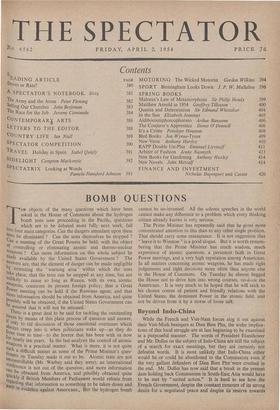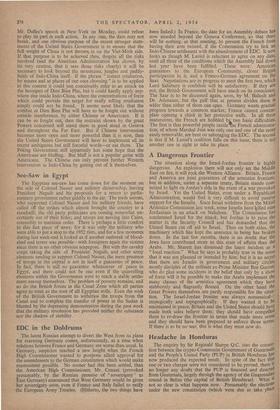Beyond Indo-China
While the French and Viet-Nam forces slog it out against their Viet-Minh besiegers at Dien Bien Phu, the wider implica- tions of this local struggle are at last beginning to be examined in a purposeful manner. The words of President Eisenhower and Mr. Dulles on the subject of Indo-China are still the subject of a search for exact meanings, but they are certainly not defeatist words. It is most unlikely that Indo-China either would be or could be abandoned to the Communists even if the very gallant defenders of Dien Bien Phu were crushed in the end. Mr. Dulles has now said that a break in the present dam holding back Communism in South-East Asia would have to be met by " united action." It is hard to see how the French Government, despite the constant rumours of its strong desire for a negotiated peace and despite its reserve towards Mr. Dulles's speech in New York on Monday, could refuse to play its part in such action. In any case, the dam may not break, and one obvious purpose of the recent stronger state- ments of the United States Government is to ensure that the full weight of China is not thrown, in on the Viet-Minh side. If that purpose is to be achieved then, despite all the risks involved (and the American Administration has shown, by its very caution, that it sees those risks clearly) it will be necessary to look beyond the mountains, jungles • and paddy- fields of Indo-China itself. If the phrase " instant retaliation, by means and at places of our own choosing " is to be applied in this context it could just conceivably refer to an attack on the besiegers of Dien Bien Phu, but it could hardly apply any- where else inside Indo-China, where the concentrations of force which could provide the target for really telling retaliation, simply could not be found. It seems most likely that the combat at Dien Bien Phu will have to be fought out without outside interference, by either Chinese or Americans. If it can be so fought out, then the restraint shown by the great Powers concerned will stand them in good stead in Geneva and throughout the Far East. But if Chinese intervention becomes more open and more powerful than it is now, then the United States Government will have to implement all its recent ambiguous but still forceful words—or eat them. The Peking Government still apparently has some hope that the Americans are bluffing. But bluff is not a popular game with Americans. The Chinese can only prevent further Western intervention in Indo-China by getting out of it themselves.



















































 Previous page
Previous page